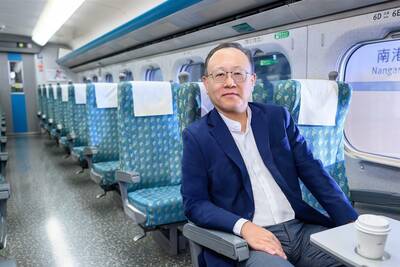Senior officials from Taiwan and China yesterday pledged to expand trade during a meeting between the two nations in Taipei in preparation for the next round of high-level talks, during which a service trade agreement is expected to be signed.
The deputy heads of Taiwan’s Straits Exchange Foundation (SEF) and China’s Association for Relations Across the Taiwan Straits (ARATS) said it is an ideal time for a service trade agreement.
As both nations are eager to develop their service sectors, they could complement each other and jointly expand their markets, SEF Vice Chairman Kao Koong-lian (高孔廉) said.
Kao said that last year the service industry’s share of GDP in Taiwan and China accounted for 72 percent and 44.6 percent respectively, which shows the countries are in different stages of development and well positioned for separate niche markets.
Taiwan could tap into China’s massive market, and Chinese customers could experience Taiwan’s high-quality e-commerce, travel and healthcare services, Kao added.
“A message is being sent to the world that Taiwan and China aim to further liberalize cross-strait exchanges,” Kao said.
Both sides should work together to join the multinational trade groups the Trans-Pacific Partnership (TPP) and the Regional Comprehensive Economic Partnership (RCEP) to further integrate into the regional economy, he said.
The Taiwanese government is prepared for any downside the agreement could bring to the domestic service sector, although officials have said the impact would be small, Kao said.
ARATS Vice Chairman Zheng Lizhong (鄭立中) said that common interests have emerged between Taiwanese and Chinese investors, and the trade pact would create more opportunities for cross-strait cooperation.
“We believe the agreement will benefit the service sectors on both sides and contribute to a flourishing market,” said Zheng, who arrived in Taiwan around noon and is to return to China today.
The three-hour preparatory meet at SEF’s headquarters is expected to conclude with a final text of the service trade agreement, which would be signed by SEF Chairman Lin Join-sane (林中森) and his ARATS counterpart, Chen Deming (陳德銘).
The Lin-Chen talks are due to be held in Shanghai on Friday and Saturday next week.

The inspection equipment and data transmission system for new robotic dogs that Taipei is planning to use for sidewalk patrols were developed by a Taiwanese company, the city’s New Construction Office said today, dismissing concerns that the China-made robots could pose a security risk. The city is bringing in smart robotic dogs to help with sidewalk inspections, Taipei Deputy Mayor Lee Ssu-chuan (李四川) said on Facebook. Equipped with a panoramic surveillance system, the robots would be able to automatically flag problems and easily navigate narrow sidewalks, making inspections faster and more accurate, Lee said. By collecting more accurate data, they would help Taipei

STATS: Taiwan’s average life expectancy of 80.77 years was lower than that of Japan, Singapore and South Korea, but higher than in China, Malaysia and Indonesia Taiwan’s average life expectancy last year increased to 80.77 years, but was still not back to its pre-COVID-19 pandemic peak of 81.32 years in 2020, the Ministry of the Interior said yesterday. The average life expectancy last year increased the 0.54 years from 2023, the ministry said in a statement. For men and women, the average life expectancy last year was 77.42 years and 84.30 years respectively, up 0.48 years and 0.56 years from the previous year. Taiwan’s average life expectancy peaked at 81.32 years in 2020, as the nation was relatively unaffected by the pandemic that year. The metric

TAKING STOCK: The USMC is rebuilding a once-abandoned airfield in Palau to support large-scale ground operations as China’s missile range grows, Naval News reported The US Marine Corps (USMC) is considering new sites for stockpiling equipment in the West Pacific to harden military supply chains and enhance mobility across the Indo-Pacific region, US-based Naval News reported on Saturday. The proposed sites in Palau — one of Taiwan’s diplomatic allies — and Australia would enable a “rapid standup of stored equipment within a year” of the program’s approval, the report said, citing documents published by the USMC last month. In Palau, the service is rebuilding a formerly abandoned World War II-era airfield and establishing ancillary structures to support large-scale ground operations “as China’s missile range and magazine

Passengers on Taiwan High Speed Rail (THSR) will be required to use headphones and make phone calls in gangways under new “quiet travel” rules starting Sept. 22. THSR Chairman Shih Che (史哲) told media that THSR will run a three-month promotional campaign to ensure widespread adoption of the new rules. Those repeatedly ignoring the guidance face the potential termination of their transport contract, which can result in them getting escorted off the train, according to THSR. Shih shared his hope to cultivate an environment conducive to rest and reading for the train’s passengers, stating that these changes aim to “promote self-discipline” among passengers